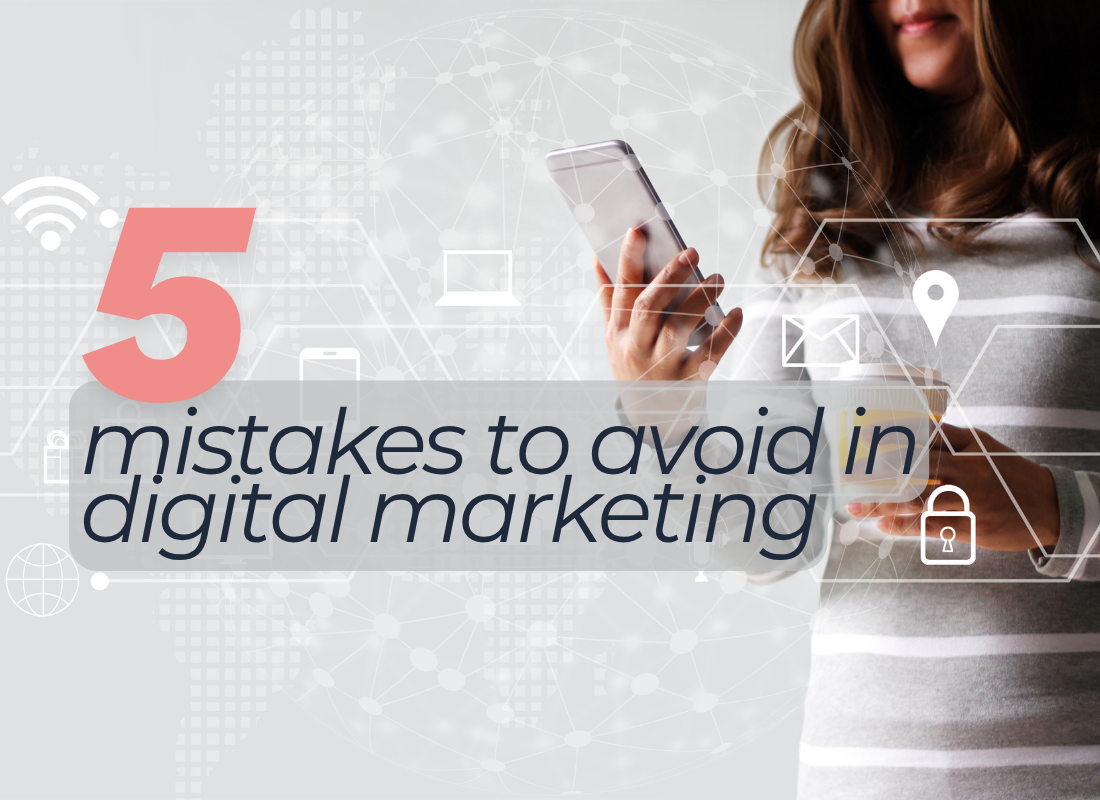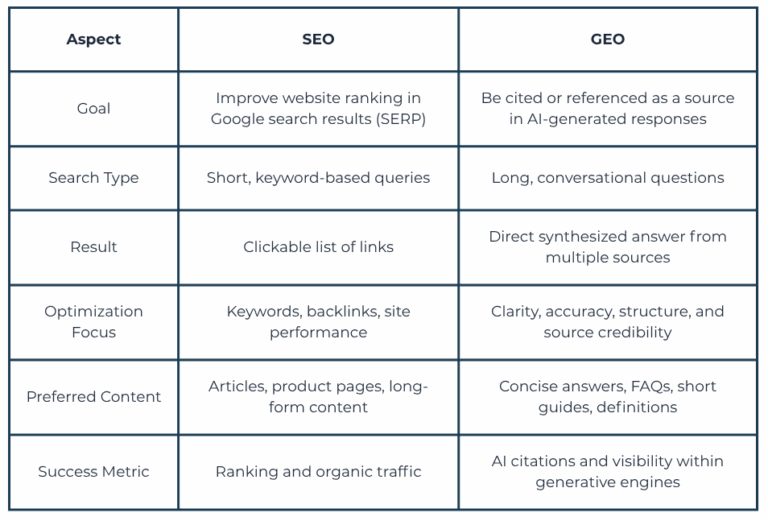
Common Digital Marketing Mistakes (and How to Avoid Them in 2025)
In 2025, digital marketing is no longer a luxury — it’s a necessity.
Yet many businesses continue to waste time and resources repeating the same mistakes, often inherited from pre–artificial intelligence (AI) habits.
Algorithms evolve, user behaviors change, and search engines no longer work the way they used to. The good news? These mistakes are easy to fix once you understand what has truly changed.
Here are the five most common mistakes we see among our clients — and more importantly, how to avoid them to build a sustainable, high-performing strategy.
Mistake #1 — Ignoring the Transition from SEO to GEO (Generative Engine Optimization)
For years, digital marketing priorities were clear: ranking at the top of Google results through SEO (Search Engine Optimization).
But in 2025, a new era has begun — that of GEO (Generative Engine Optimization).
Traditional search engines (like Google, Yahoo!, or Bing) display a list of links. Generative engines (such as ChatGPT, Gemini, or Perplexity) directly create an answer, pulling from sources they consider trustworthy.¹²
The new challenge is no longer just being found, but being cited.
SEO vs GEO: Understanding the Difference

What This Means for Your Business
SEO remains essential — but it’s no longer enough.
Users increasingly get their answers without ever clicking on your website.
To stay visible, your content must become the source AI engines trust to build their responses.
How to Adapt
- Strengthen Your SEO Foundation
- Complete your Google Business Profile with descriptions, photos, and services.
- Use geographic and industry-specific keywords.
- Make sure your website is fast, mobile-friendly, and well-structured (H1–H2 hierarchy, sitemap, etc.).
- Prepare Your Content for GEO
- Write clear, concise, and informative paragraphs.
- Answer specific questions (“How…?”, “Why…?”).
- Include verifiable data, studies, and citations.
- Use a natural, conversational, and educational tone.
- Build Source Credibility
- Showcase your expertise (case studies, testimonials, bylined articles).
- Earn high-quality backlinks from trusted websites.
- Clearly mention your brand and area of expertise on every page.
SEO helps you get found.
GEO helps you get remembered.
The companies that embrace both will be the ones AI recommends tomorrow.
Mistake #2 — Underestimating LinkedIn as a Branding Lever
LinkedIn is now the most strategic platform for B2B companies — and for leaders, founders, and experts looking to strengthen their credibility. Yet most small and medium-sized businesses still post too little — or poorly.
They often limit themselves to cold, corporate announcements or generic product updates.
But on LinkedIn, what works are conversations, authenticity, and value.
How to Leverage LinkedIn in 2025
- Humanize Your Presence
Share your learnings, clients, and projects.
Show behind-the-scenes moments, trials, and mistakes.
Authentic content performs better than “perfect” posts. - Provide Real Value
Offer practical advice, case studies, or trend insights.
The goal: your audience should learn something from you. - Encourage Employee Personal Branding
Your team and leaders are your best ambassadors.
When multiple voices from one company speak up, organic reach skyrockets. - Diversify Your Formats
Carousels, short videos, quotes, testimonials — LinkedIn rewards variety.
And if you serve bilingual markets, don’t hesitate to post in both English and French.
Why It Matters
LinkedIn’s algorithm favors people over pages.
In 2025, an effective strategy combines brand visibility with authentic individual voices.
Leaders who post regularly build credibility, attract better partners, and inspire trust.
At Pacific Québec, we help businesses and professionals develop authentic, bilingual LinkedIn strategies that align visual identity, human tone, and business goals.
Mistake #3 — Creating Content Without a Clear Strategy
Publishing without an editorial plan is like sailing without a compass.
Many companies post sporadically, on random topics, with no measurable goal — leading to low engagement, wasted time, and a lack of brand consistency.
How to fix it:
- Create an editorial calendar aligned with your business objectives.
- Define your personas and their real needs.
- Plan your content across multiple channels (website, newsletter, social media).
- Measure your results (clicks, shares, conversions) and adjust accordingly.
Consistent, intentional content — even less frequent — has far more impact than a flood of random posts.
Mistake #4 — Misusing Artificial Intelligence
AI is now an essential tool, but also a source of confusion.
Some companies avoid it out of fear, while others rely on it blindly — producing generic, soulless content.
The key lies in balance:
- Use AI to save time (idea generation, planning, SEO/GEO analysis).
- Keep the human touch for tone, storytelling, and validation.
- Always proofread AI-generated text.
- Customize your content for your culture, market, and brand voice.
AI can enhance your strategy — but it will never replace your authenticity.
Mistake #5 — Neglecting Online Reputation and Customer Reviews
Customer reviews are the new currency of trust.
According to BrightLocal, 87% of consumers read reviews before making a purchase.³
Yet many businesses still leave this to chance.
How to fix it:
- Always request a review after a purchase or service
- Respond to every comment — even negative ones.
- Highlight positive testimonials on your website and social media.
A happy customer who speaks up is often more valuable than a paid ad campaign.
Conclusion
Digital marketing in 2025 rewards clarity, consistency, and credibility.
The most successful companies are those that:
- Understand the transition from SEO to GEO,
- Build a human presence on LinkedIn,
- Publish with strategy and intention,
- Use AI intelligently,
- And manage their online reputation proactively.
At Pacific Québec, we help businesses adapt their digital strategies to the new reality of the web — a web where AI, localization, and culture intersect.
